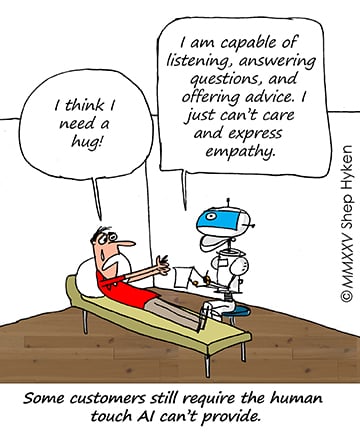 I’m often asked, “What should AI be used for?” While there is much that AI can do to support businesses in general, it’s obvious that I’m being asked how it relates to customer service and customer experience (CX). The true meaning of the question is more about what tasks AI can do to support a customer, thereby potentially eliminating the need for a live agent who deals directly with customers.
I’m often asked, “What should AI be used for?” While there is much that AI can do to support businesses in general, it’s obvious that I’m being asked how it relates to customer service and customer experience (CX). The true meaning of the question is more about what tasks AI can do to support a customer, thereby potentially eliminating the need for a live agent who deals directly with customers.
First, as the title of this article implies, just because AI can do something, it doesn’t mean it should. Yes, AI can handle many customer support issues, but even if every customer were willing to accept that AI can deliver good support, there are some sensitive and complicated issues for which customers would prefer to talk to a human.
Additionally, consider that, based on my annual customer experience research, 68% of customers (that’s almost seven out of 10) prefer the phone as their primary means of communication with a company or brand. However, another finding in the report is worth mentioning: 34% of customers stopped doing business with a company because self-service options were not provided. Some customers insist on the self-service option, but at the same time, they want to be transferred to a live agent when appropriate.
AI works well for simple issues, such as password resets, tracking orders, appointment scheduling and answering basic or frequently asked questions. Humans are better suited for handling complaints and issues that need empathy, complex problem-solving situations that require judgment calls and communicating bad news.
An AI-fueled chatbot can answer many questions, but when a medical patient contacts the doctor’s office about test results related to a serious issue, they will likely want to speak with a nurse or doctor, not a chatbot.
Consider these questions before implementing AI for customer interactions
AI for addressing simple customer issues has become affordable for even the smallest businesses, and an increasing number of customers are willing to use AI-powered customer support for the right reasons. Consider these questions before implementing AI for customer interactions:
- Is the customer’s question routine or fact-based?
- Does it require empathy, emotion, understanding and/or judgment (emotional intelligence)?
- Could the wrong answer cause a problem or frustrate the customer?
- As you think about the reasons customers call, which ones would they feel comfortable having AI handle?
- Do you have an easy and seamless way for customers to be transferred to a human when needed?
The point is, regardless of how capable the technology is, it doesn’t mean it is best suited to deliver what the customer wants. Live agents can “read the customer” and know how to effectively communicate and empathize with them. AI can’t do that … yet. The key isn’t choosing between AI and humans. It’s knowing when to use each one.









